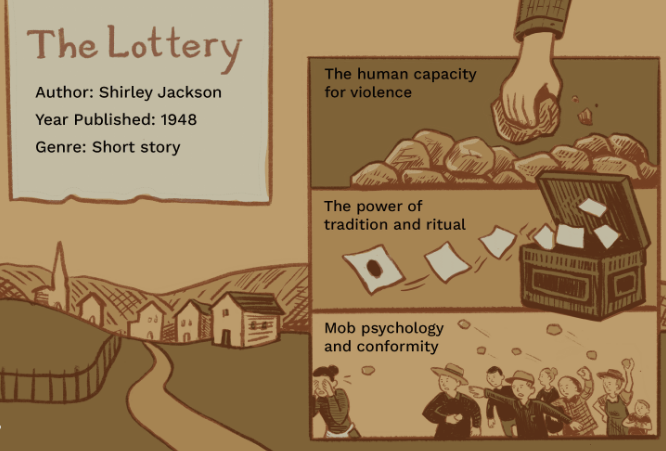The Lottery’ by Shirley Jackson: Controversy & Themes

Introduction:
Shirley Jackson’s “The Lottery” is a short story that has captivated readers for decades. Its unsettling narrative and profound themes have sparked numerous discussions and debates. But what is the main point of “The Lottery”? And why did it stir such controversy upon its release? Let’s delve into the depths of this literary masterpiece to uncover its significance.
Also Read:- Jeremy Strong: From ‘Pitch Perfect’ Rumors to His Rise to Fame
The Setting and Atmosphere:
At first glance, “The Lottery” paints a picture of a quaint village, where life seems ordinary and uneventful. The story begins with children playing, women gossiping, and men discussing everyday matters. However, as the narrative unfolds, the seemingly peaceful setting takes a dark turn, revealing a chilling tradition that the villagers blindly follow.
The Main Point of “The Lottery”:
The primary theme of “The Lottery” revolves around the dangers of blindly following traditions without questioning their morality or purpose. The villagers in the story participate in a horrifying ritual, where a member is selected by a random draw to be stoned to death. This annual event is accepted by the community without question, highlighting the human tendency to adhere to customs, even if they are inhumane or irrational.
Jackson’s portrayal of the lottery ritual serves as a metaphor for societal norms and practices that might be accepted without scrutiny. By presenting a community that unquestioningly partakes in a brutal act, Jackson challenges readers to reflect on their own beliefs and the traditions they uphold.
Why Was “The Lottery” So Controversial?
When “The Lottery” was first published in The New Yorker in 1948, it received an unprecedented response. The magazine was flooded with letters from readers, many expressing shock, dismay, and even outrage. But what made this story so controversial?
- Graphic Violence: The story’s climax, where a woman is stoned to death by her own community, including her family, was disturbing for many readers. The graphic nature of the violence, juxtaposed with the story’s calm beginning, left a lasting impact.
- Challenging Traditions: Jackson’s narrative questioned the blind adherence to traditions, a theme that resonated with post-World War II America. The story forced readers to confront the dangers of conformity and the consequences of unexamined beliefs.
- Ambiguity: Jackson never provided a clear explanation for the lottery ritual, leaving readers to grapple with its meaning. This ambiguity added to the story’s unsettling nature, as readers were left to interpret the narrative’s significance on their own.
The Characters and Their Roles:
Each character in “The Lottery” plays a crucial role in conveying the story’s themes:
- Tessie Hutchinson: The unfortunate “winner” of the lottery, Tessie’s fate underscores the story’s central message. Her initial casual attitude towards the lottery changes dramatically when she becomes the chosen one, highlighting the human tendency to dismiss injustices until they personally affect us.
- Old Man Warner: Representing the older generation, Old Man Warner’s staunch defense of the lottery showcases the dangers of clinging to outdated beliefs. His dismissal of those who have abandoned the lottery in other villages underscores the resistance to change.
- Mr. Summers: As the conductor of the lottery, Mr. Summers represents the authority that enforces societal norms. His casual approach to the event emphasizes the normalization of the horrific act.
Conclusion:
“The Lottery” by Shirley Jackson is more than just a tale of a chilling ritual; it’s a commentary on the human condition. By exploring the dangers of blind conformity and the consequences of unexamined traditions, Jackson crafted a story that remains relevant even today. Its controversial nature stems from its ability to hold a mirror to society, forcing readers to confront their own beliefs and the traditions they uphold. As we reflect on “The Lottery,” let us remember the importance of questioning, understanding, and, if necessary, challenging the customs we encounter in our lives.
FAQs about “The Lottery” by Shirley Jackson:
- What is “The Lottery” about?
- It’s a short story depicting a village’s chilling ritual where a member is chosen randomly to be stoned to death.
- Who wrote “The Lottery”?
- The story was written by Shirley Jackson.
- When was “The Lottery” published?
- It was published in 1948 in The New Yorker.
- Why is “The Lottery” controversial?
- Due to its graphic violence and themes challenging blind adherence to traditions.
- What is the main theme of “The Lottery”?
- The dangers of blindly following traditions without questioning their morality or purpose.
- Who is the “winner” of the lottery?
- Tessie Hutchinson is chosen in the story’s climax.
- Is “The Lottery” based on a true story?
- No, it’s a fictional story, but it reflects societal tendencies.
- Why do the villagers conduct the lottery?
- It’s a long-standing tradition, the origins of which are not clearly explained in the story.
- Has “The Lottery” been adapted into other media?
- Yes, it has been adapted into plays, television shows, and films.
- Where can I read “The Lottery”?
- It’s available in various anthologies, libraries, and online platforms. Always ensure you access it from legitimate sources.







